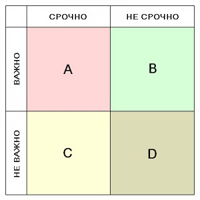How to plan time and do everything?

Time should work for you, not you for it. Each of us often has the feeling that the day has flown by, and nothing important has been done. You will find a lot of reasons, and psychologists and time managers will say that you do not know how to manage your time. After all, the ability to organize and build your day, control your time and set priorities correctly can be learned. And this means that you can manage to do everything that is planned.
How to do it?
First of all, you need to find time and write down on a piece of paper all the things that you have planned for the day.
Divide these tasks into 4 groups according to their importance and urgency:
1. Important and urgent. 2. Important but not urgent. 3. Urgent but not important. 4. Not urgent and not important.
Each task, given its importance and urgency, must be placed in one of the squares shown in the figure.
Square A
" Important and urgent " are matters that need to be given top priority. These are such urgent matters as projects with deadlines burning, solving crisis situations, etc.
This is not only force majeure, but also lack of professionalism: we often start the working day with minor, simple things. At the same time, for several days we have been postponing a not yet urgent, but important project or a call. Over time, important things turn into urgent ones.
This should not be allowed, because important and urgent tasks do not allow us to control and analyze the process: we do not have time to prepare for the meeting or form a good report. You have to improvise, and the best improvisation is planned in advance.
Ideally, if square A is empty. This speaks of you as a professional with excellent self-organization.
Square V.
" Important, but not urgent " - this is daily current work, planning new projects, analyzing and evaluating the information received, learning foreign languages, etc.
This is a working square, which should be filled as much as possible compared to the rest.
After all, if you have a margin of time to pay due attention to the tasks of this square, then you will quickly achieve success.
Square C
“ Not important, but urgent ” - these things bring us little closer to the goal, while they need to be done. This may be an unscheduled meeting that cannot be refused, urgent meetings, a problem that needs to be urgent, etc.
Square D
" Not important and not urgent " - these are those things that rarely bring benefits, but take time. You need to get rid of the to-do list in square D or allocate no more than 2 hours a week for their implementation.
Time cannot be stopped or returned, but you can use it in such a way that you can do everything and reach your goal!
